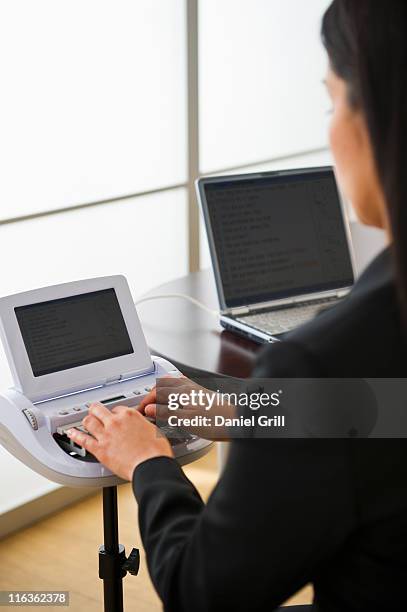Discovering the Day-to-Day Responsibilities of a Court Typist in the Judicial System
As you navigate the complex globe of the judicial system, you might locate on your own curious regarding the function of a court typist. This position is even more than simply keying; it involves capturing every word spoken throughout proceedings with precision. Daily presents unique obstacles and duties that are crucial for maintaining the integrity of lawful records. Understanding what a court typist does can disclose understandings into the broader functions of justice. What does it require to master this role?
Introduction of the Court Typist Function
As you step right into the role of a court typist, you'll find it is necessary to comprehend the vital duties included. You'll act as a crucial web link in the judicial process, making sure that all spoken words throughout court procedures are precisely recorded and recorded. Your job sustains the honesty of the lawful system, making your focus to detail imperative.You'll run customized transcription tools, transforming audio recordings right into written records. Knowing with legal terms and court procedures is crucial, as you'll usually experience intricate language and jargon.You'll also need to maintain discretion and take care of sensitive details with care. Your duty needs you to work successfully under pressure, frequently with tight deadlines, while staying focused on generating clear, precise transcripts. As a court typist, you play an important role in preserving the official document of court process, adding significantly to the overall functioning of the judiciary.

Key Responsibilities of a Court Typist
While you'll often be concentrated on catching talked words during court proceedings, your crucial duties as a court typist expand much beyond transcription. You'll prepare and keep accurate documents of court activities, ensuring they show every detail of the process. You'll likewise format files, such as legal briefs and summons, adhering to rigorous guidelines and deadlines.In addition, you'll organize and take care of situation documents, making it easier for judges and lawyers to gain access to essential information swiftly. You're anticipated to check and modify records for quality and precision, which is vital for the stability of legal proceedings.Moreover, you'll function carefully with judges, staffs, and attorneys, preserving open communication to deal with any type of demands or discrepancies. Your duty is essential in ensuring that the judicial process runs smoothly, providing a reputable written account of what takes place in the court.
Important Abilities for Court Typists
As a court typist, you need to understand both typing rate and precision to stay up to date with the needs of the court. Experience with lawful terminology is also important, as it ensures you properly capture the procedures. These skills not just improve your efficiency but also add to the overall performance of the legal process.
Entering Rate and Accuracy
Entering rate and precision are necessary abilities that every court typist must master to assure the integrity and efficiency of legal documents. You need to kind rapidly yet very carefully, as also minor errors can result in considerable misconceptions in lawful contexts. A high inputting rate enables you to stay on par with fast-paced court procedures, guaranteeing that every word is recorded precisely. Practicing frequently can assist you improve your speed, while concentrating on precision assists decrease blunders. Making use of tools like dictation software program or text expanders can additionally boost your performance. Bear in mind, your role is essential in preserving exact records, so sharpening these abilities not just advantages you yet likewise supports the whole judicial procedure.
Lawful Terminology Proficiency
Mastering lawful terminology is crucial for court typists to assure precise and efficient documentation. You need to acquaint on your own with numerous legal phrases, jargon, and principles typically made use of in court process. This knowledge aids you record recordings and draft documents with accuracy. When you comprehend terms like "plaintiff," "accused," and "subpoena," you'll decrease the possibilities of mistakes that might jeopardize legal proceedings.Additionally, exceling in lawful terminology increases your self-confidence while functioning alongside courts, attorneys, and various other attorneys. You'll locate it much easier to comply with conversations and precisely catch the significance of what's being claimed. court typist. Continual discovering and method will certainly improve your abilities, making you a valuable asset in the judicial system
Tools and Technology Utilized by Court Typists
As a court typist, you depend on different devices and innovation to execute your obligations efficiently. You'll require important typing tools, straightforward software applications, and audio transcription devices to equal the needs of your job. Allow's explore how each of these elements plays an important duty in your daily jobs.
Important Keying Devices
While court typists rely greatly on their skills, the ideal tools is crucial for efficiency and accuracy. To start with, a premium keyboard is important for accurate and rapid inputting, allowing you to maintain speed with court room proceedings. Ergonomic designs can help protect against strain throughout lengthy sessions. A trustworthy computer with ample handling power assurances smooth operation, specifically when handling big records (court typist). You'll also require an excellent printer for generating clear copies of records. Noise-canceling earphones can be advantageous throughout recordings, assisting you focus on audio clarity. In addition, an efficient workspace and a comfy chair advertise performance. With the best tools, you can improve your inputting capabilities and support the judicial procedure efficiently
Software Application Applications Used
To successfully record court visit site procedures, you'll depend on a variety of specialized software applications made for precision and speed. These programs usually include word processing software, which helps you layout records quickly and correctly. You'll additionally utilize legal-specific software application that assists in taking care of situation documents and preserving records, guaranteeing you can easily access critical information.Another crucial device is real-time transcription software application, enabling you to generate records as the process unravel. Furthermore, you may use file administration systems to organize and retrieve data easily. With these applications, you'll boost your performance and maintain the high standards called for in the judicial system, enabling you to focus on your keying skills and the task at hand.

Audio Transcription Devices
Court typists commonly depend on a variety of audio transcription devices to improve the accuracy of their work. These tools assist you transform spoken words right into written text successfully. You may use software application like Dragon NaturallySpeaking or Otter.ai, which use voice recognition capabilities, enabling fast transcription. Furthermore, audio playback tools enable you to listen to recordings repeatedly, guaranteeing you record every information correctly. Some court typists additionally make use of foot pedals, allowing you control audio playback hands-free while you type. This mix of technology not only speeds up the transcription process yet additionally minimizes mistakes. Acquainting yourself with these tools can considerably enhance your productivity and the high quality of your transcriptions in the busy judicial setting.
Challenges Faced by Court Typists
Many might see the function of a court typist as straightforward, you'll promptly uncover that it comes with a distinct collection of difficulties. One major difficulty is the quick speed of court procedures. You'll need to keep up with rapid dialogues, which can be daunting, particularly when several speakers are involved. Furthermore, the legal lingo used in court can be intricate and unknown, needing you to frequently learn and adapt.Another challenge is the stress of tight due dates. You often need to produce records promptly, which can lead to anxiety and prospective mistakes. Additionally, keeping emphasis for extended periods is important, as even a temporary gap can influence your work.Lastly, handling personal details indicates you must constantly focus on protection and discretion, adding another layer of responsibility to your function. Balancing these obstacles becomes crucial for anyone in the position of a court typist.
The Importance of Accuracy and Focus to Information
Accuracy and focus to information are essential for advice court typists, as also minor mistakes can cause considerable misconceptions in lawful process. You are accountable for recording court hearings, lawful records, and various other necessary details, where every word matters. A simple typo or lost punctuation could change the definition of a declaration, potentially impacting the outcome of a case.When you concentrate on accuracy, you assist maintain the honesty of the judicial system. Your careful work sustains lawyers, judges, and clients by offering exact and clear documents. Focus to information also lessens the threat of pricey hold-ups and guarantees that all parties included have access to reliable files.
Occupation Path and Opportunities for Court Typists
Grasping precision and attention to information not only enhances your current role but likewise opens up doors to numerous job courses for court typists. As you gain experience, you may consider advancing to settings such as lawful secretary or administrative assistant in law office, where your abilities in transcription and file monitoring will be invaluable.You could likewise explore possibilities in court coverage, which usually requires added training yet supplies a chance to engage even more straight with courtroom proceedings.If you enjoy the management side, positions in situation monitoring or lawful research could be a wonderful fit.With additionally education and learning, you could even become a paralegal, assisting attorneys with case preparation.Networking with legal experts can assist you reveal hidden opportunities.Ultimately, your structure as a court typist equips you with skills that are commonly applicable throughout the legal landscape, leading the way for a meeting profession.
Frequently Asked Concerns

What Certifications Are Needed to Come To Be a Court Typist?
To become a court typist, you'll need strong typing skills, understanding of legal terms, and interest to detail. A high institution diploma is frequently needed, and certifications in transcription can boost your credentials.
How Does a Court Typist Handle Confidential Info?
You deal with secret information by complying with rigorous methods, utilizing secure systems, and keeping discernment. You're educated to identify delicate data and guarantee Source it's stored and shared only with licensed workers, securing the integrity of the information.
What Is the Typical Job Environment for Court Typists?
You'll generally locate court typists in an official workplace setup, typically bordered by legal professionals. The setting's typically silent, focused, and structured, allowing you to focus on transcribing and managing delicate papers effectively.
Are Court Typists Required to Take Dictation Throughout Trials?
Yes, court typists typically take dictation during trials. You'll require to listen thoroughly, recording legal procedures accurately and efficiently. Your focus and rate will certainly guarantee that every detail is captured for authorities records.
Exactly How Do Court Typists Handle Due Dates During Busy Periods?
Throughout hectic periods, you focus on tasks by organizing your workload and using effective typing techniques. You set realistic deadlines, connect with coworkers, and stay focused to guarantee all documents are finished properly and promptly. While you'll usually be concentrated on recording spoken words throughout court proceedings, your essential responsibilities as a court typist extend far beyond transcription. Keying in rate and accuracy are necessary abilities that every court typist must understand to guarantee the stability and performance of lawful documents. Mastering legal terminology is important for court typists to guarantee reliable and precise documents. Accuracy and focus to detail are essential for court typists, as even small mistakes can lead to substantial misunderstandings in lawful proceedings. court typist. To come to be a court typist, you'll require strong keying skills, knowledge of lawful terms, and focus to detail